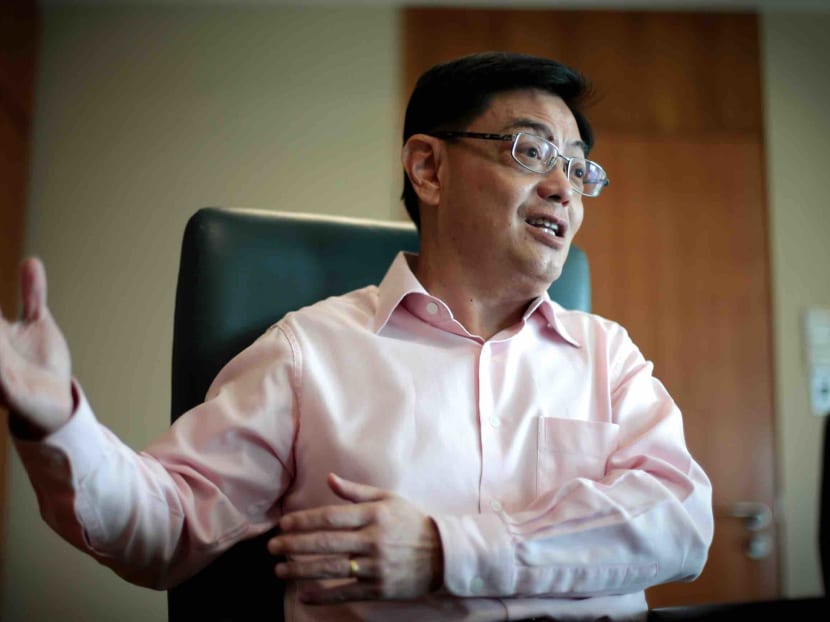School content being cut to focus on critical learning
SINGAPORE — There will be greater emphasis in the educational system here on students’ application of knowledge in the coming years, even in the post-secondary institutions — be it the polytechincs, the Institute of Technical Education or the universities, Education Minister Heng Swee Keat told TODAY in an interview earlier this week.
SINGAPORE — There will be greater emphasis in the educational system here on students’ application of knowledge in the coming years, even in the post-secondary institutions — be it the polytechincs, the Institute of Technical Education or the universities, Education Minister Heng Swee Keat told TODAY in an interview earlier this week.
Since the introduction of the “teach less, learn more” policy in 2005, up to 20 per cent of content has been reduced from syllabuses implemented across the primary, secondary and pre-university levels. There has also been a shift away from rote learning, as policymakers respond to concerns over the amount of content being taught in the schools and the cramming that students do before examinations.
But of late, a different sort of complaints among parents has surfaced, particularly on social media - exam or test questions are too tough, and seemingly beyond what their children has been learning in the classroom.
Acknowledging a gap in the public’s awareness and understanding of the changes in the system, Mr Heng said these questions — which are deliberately set to help students develop critical learning and go beyond rote-learning — are not simply solved by hitting the books. “Many of these questions are not intended for more studying (of content), but really, it is to encourage (students) to apply what they have learnt in an unfamiliar context”, he said.
At schools, exams have been recalibrated to include some questions that require students to apply the knowledge learnt to solve problems. Starting from this year, the Singapore Examinations and Assessment Board would release Primary School Leaving Examination papers from the previous three years so that parents can be more aware of the exam standards.
Mr Heng noted the “systematic reduction” in content being taught in the schools. Content which constitutes essential knowledge, skills and values that preserve the integrity of the subject and provide a firm foundation for further learning at higher level, has been retained. Concepts or skills which are not critical were removed. This included content that relies on recall or focuses on technical details not critical to students’ understanding of a topic. Content that overlaps or is dealt with in other subjects or programmes was also removed.
For example, the topic on “Simple Machine” was removed from the primary science syllabus and some of the concepts are covered in secondary school instead.
During an Institute of Policy Studies forum last month, Deputy Prime Minister and Finance Minister Tharman Shanmugaratnam was asked by American journalist Fareed Zakaria on whether Singapore needs to shift away from a system of testing to encourage creativity. In response, Mr Tharman said: “The toughest question to ask ourselves... is not what we add to the education system, but what we subtract.”
Mr Heng, who entered politics in 2011 and was appointed as Education Minister soon after, said the level of content being taught in schools is in a “reasonable position”. Under his watch, several initiatives have been rolled out to enable students to apply the knowledge acquired in classrooms. These included the Applied Learning and Learning for Life programmes.
Under the Applied Learning programme, for instance, students can apply their math and physics knowledge to robotics.
Moving away from purely using tests to gauge students’ abilities and progress, holistic assessment and discretionary admissions have also been introduced at the lower primary and tertiary levels, respectively. On whether this approach can be applied more pervasively in the educational system, Mr Heng said caution has to be exercised because much resources would be required and minimum standards have to be maintained.
“There’s a lot of human judgement (involved),” he said. “It is, again, a balance in assuring parents that the criteria are fair and transparent and at the same time, the criteria allows us to encourage students develop more fully.”
While he believes that “not everything in life can tested”, Mr Heng said there is a place for testing, as well-designed tests help learning.
On the age-old debate on whether Singaporean students lack creativity, Mr Heng recounted his recent experience of meeting primary school pupils who were playing with the SG50 lego set and coming up with imaginative designs of playgrounds.
Mr Heng said: “Innovation starts first with empathy.” By thinking about what other people need would lead to the creative application of knowledge and the seeking of answers to problems, he added.
For any innovation to make an impact, it has to stand out on the regional or global stage, he noted. In this regard, Singaporeans have be encouraged to see the world as their oyster, he said,
Mr Heng added that the multi-cultural make-up of Singapore society would give Singaporeans a headstart. “We are among few countries in the world (whose) citizens can be comfortable all over the world,” he said.
Mr Heng is confident that with the various initiatives underway, the Republic’s educational system will stand young Singaporeans in good stead, as they take on the world.
“In the coming years, our students will be better able to empathise, to communicate, to imagine, and these qualities will prepare them better for the future.”







